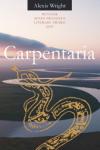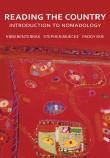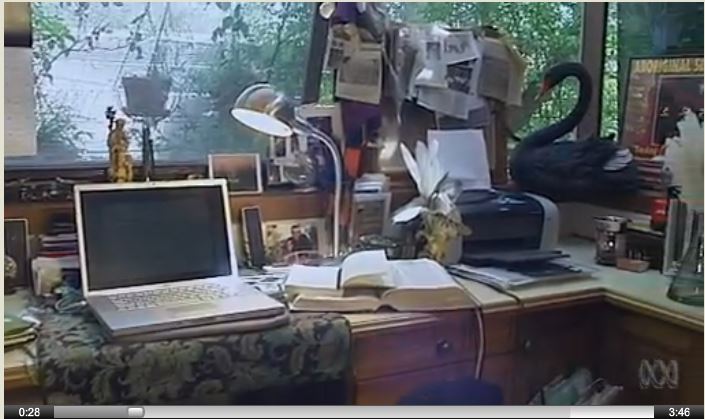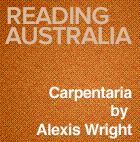AustLit
-
Alexis Wright's Carpentaria is set in the Gulf of Carpentaria region in a fictional town called Desperance. The novel follows the interactions of and tensions between various local residents and groups, including Indigenous residents, white officials, and a mining company.
– Part One of this trail focuses on the representation of time within the novel.
– Part Two examines the depiction of the rubbish dump.
– Part Three draws together more general information such as reviews of the book. The trail concludes with a list of interviews of Wright and suggestions for further reading. Some of these critical works and other resources are available to read online.
Click the hyperlinks in the citations below to be taken to the full text.
-
 Image courtesy of Giramondo PublishingCarpentaria's portrait of life in the precariously settled coastal town of Desperance centres on the powerful Phantom family, whose members are the leaders of the Pricklebush people, and their battles with old Joseph Midnight's tearaway Eastend mob on the one hand, and the white officials of Uptown and the neighbouring Gurfurrit mine on the other. Wright's storytelling is operatic and surreal: a blend of myth and scripture, politics and farce. The novel is populated by extraordinary characters - Elias Smith the outcast saviour, the religious zealot Mozzie Fishman, leader of the holy Aboriginal pilgrimage, the murderous mayor Stan Bruiser, the ever-vigilant Captain Nicoli Finn, the activist and prodigal son Will Phantom, and above all, Angel Day the queen of the rubbish-dump, and her sea-faring husband Normal Phantom, the fish-embalming king of time - figures that stand like giants in this storm-swept world. (...more)See full AustLit entry
Image courtesy of Giramondo PublishingCarpentaria's portrait of life in the precariously settled coastal town of Desperance centres on the powerful Phantom family, whose members are the leaders of the Pricklebush people, and their battles with old Joseph Midnight's tearaway Eastend mob on the one hand, and the white officials of Uptown and the neighbouring Gurfurrit mine on the other. Wright's storytelling is operatic and surreal: a blend of myth and scripture, politics and farce. The novel is populated by extraordinary characters - Elias Smith the outcast saviour, the religious zealot Mozzie Fishman, leader of the holy Aboriginal pilgrimage, the murderous mayor Stan Bruiser, the ever-vigilant Captain Nicoli Finn, the activist and prodigal son Will Phantom, and above all, Angel Day the queen of the rubbish-dump, and her sea-faring husband Normal Phantom, the fish-embalming king of time - figures that stand like giants in this storm-swept world. (...more)See full AustLit entry -
 Photo courtesy of the author.See full AustLit entry
Photo courtesy of the author.See full AustLit entryAlexis Wright, activist and award-winning writer, is from the Waanji people from the highlands of the southern Gulf of Carpentaria. After her father, a white cattleman, died when she was five, she grew up with her mother and grandmother in Cloncurry, Queensland. She has worked extensively in government departments and Aboriginal agencies across four Australian states and territories as a professional manager, educator, researcher, and writer.
Wright was coordinator of the Northern Territory Aboriginal Constitutional Convention in 1993 and wrote 'Aboriginal Self Government' for Land Rights News, later quoted in full in Henry Reynolds's Aboriginal Sovereignty (1996).
-
See full AustLit entry
Wright describes what drove her to write her novel Carpentaria, stating that 'For a long time while I was exploring how to write Carpentaria, I tried to come to some understanding of two principal questions: firstly, how to understand the idea of Indigenous people living with the stories of all the times of this country, and secondly, how to write from this perspective.'
(...more)Wright, Alexis. 'On Writing Carpentaria.' Heat 13 (New Series) Harper's Gold (2007). Online at http://logincms.uws.edu.au/__data/assets/pdf_file/0011/385949/Wright-HEATessay.pdf. Sighted 09/12/2013.
-
'Alexis Wright's Carpentaria is the story of the Phantom family, members of the Pricklebush people, who live in the fictional town of Desperance in the Gulf country of north-western Queensland. It is a long and sprawling carnivalesque novel that offers a cautiously positive outlook for Aboriginal people that also recognises the difficulties of contemporary Aboriginal experience. Carpentaria is not an historical novel in the sense of retelling an historical event; however, the past pervades the narrative as it grapples with the many ways that the past is recorded. (...more)See full AustLit entry
Molloy, Diane. 'Finding Hope in the Stories: Alexis Wright's Carpentaria and the Carnivalesque Search for a New Order.' JASAL 12.3 (2012). Online at http://www.nla.gov.au/openpublish/index.php/jasal/article/view/2253/3343. Sighted 09/12/2013.
-
See full AustLit entry
This review describes Carpentaria as a political novel that is also personal. It discusses the novel's style and argues that '[t]he narrative voice of Carpentaria is a storyteller’s voice; its narrative context, an eternal present as lived by a community for whom history and myth are interwoven. Just as the serpent is both the region’s river system and the totemic RainbowSerpent of Aboriginal creation stories, so the novel occupies two parallel time zones, or streams of activity, one linear and the other part of an infinite spiritual cycle’ (Source: review.
(...more)Lowry, Elizabeth. 'The Fishman Lives the Lore.' London Review of Books 30.8 (24 April 2004): 26-27. Online at http://www.uws.edu.au/__data/assets/pdf_file/0011/57926/lowr01_3008.pdf. Sighted 09/12/2013.
-
Some critics have focused on the role of waste in the novel, and how the floating island of rubbish operates as a space or place. The resources below discuss space/place and waste in Carpentaria, except for Reading the Country, which looks at the relationships between people and place, and Intimate Horizons, which looks at space, the sacred, and the everyday.
-
See full AustLit entry
In this essay, Hall argues that the floating island of rubbish in Alexis Wright's Carpentaria can be seen as a Foucauldian heterotopia.
(...more)Hall, Demelza. 'The Isle of Refuse in Alexis Wright's Carpentaria: Reconstructing Heterotopic Space.' Long Paddock 72.3 (2012). Online at http://southerlyjournal.com.au/long-paddock/72-3-islands-and-archipelagos/demelza-hall/. Sighted 09/12/2013.
-
See full AustLit entry
'I argue in this essay that Australian writer Alexis Wright's 2006 novel Carpentaria and New Zealand writer Elizabeth Knox's Dreamhunter series (comprising of the novels Dreamhunter (2005) and Dreamquake (2007)) call up the matter of region and the waste of modernity to secede the form of nation. As fictional spaces overlaying real places, doubling with a world of dreams and an underworld of nightmares of colonial violence, these novels also move beyond the form of realism.
(...more)Joseph, Laura. 'Dreaming Phantoms and Golems: Elements of the Place Beyond Nation in Carpentaria and Dreamhunter.' JASAL Special Issue Australian Literature in a Global World (2009). Online at http://pandora.nla.gov.au/pan/63067/20090910-1633/www.nla.gov.au/openpublish/index.php/jasal/article/view/848/1759.html. Sighted 09/12/2013.
-
 Image courtesy of publisher's website.See full AustLit entry
Image courtesy of publisher's website.See full AustLit entry'Reading the Country is a journey into Roebuck Plains, near Broome in Australia's far north-west; it is an exploration of the meaning of place, an attempt to chart the relationships between people and those specific places in which they must find a place to live. It is a journey through landscape into language and ideas, and personal and cultural location.' (Source: Publisher's Blurb, 1996 Revised Edition)
(...more)Muecke, Stephen and Paddy Roe, with Ray Keogh, Butcher Joe (Nangan) and E.M. Lohe. Reading the Country: Introduction to Nomadology. Fremantle: Fremantle Press, 1984.
-
See full AustLit entry
Despite the stereotype of post-colonial Australian society as secular and irreligious, a radical concept of the sacred, located in place, has pervaded its literature. Australian writers again and again break away from received, orthodox notions of religious experience, imagining a transformed post-colonial sacred in Australia.
For Indigenous and non-Indigenous societies 'place' has had a particularly post-colonial function in contesting imperial cultural forms, including received forms of religion.
(...more)Ashcroft, W.D., Lyn McCredden and Frances Devlin-Glass. Intimate Horizons: The Post-Colonial Sacred in Australian Literature. Adelaide: ATF Press, 2009.
-
See full AustLit entry
Ravenscroft argues that 'white critical efforts to make meaning' of Carpentaria have portrayed Wright as indebted to novelists such as Patrick White and Frank Hardy, and have also tended, 'in moves that refuse the text's unfamiliarity' to try to categorise the novel as a work magic realism. Ravenscroft goes on to offer, 'first, a more detailed critique of so‐called postcolonial magic realism in which I point to critics’ refusal to allow markers of difference in texts to be significant; indeed, to signify at all.
(...more)Ravenscroft, Alison. 'Dreaming of Others: Carpentaria and its Critics.' Cultural Studies Review 16.2 (2010): 194-224. Online at http://epress.lib.uts.edu.au/journals/index.php/csrj/article/view/1700/1832. Sighted 09/12/2013.
-
See full AustLit entry
Aitken discusses some of the political context around the time of Wright's Miles Franklin Award win, and also states that the novel 'is not an activist tract.' He discusses the narrative and the style, and concludes by stating that Carpentaria 'is the most surprising novel I have read this year, not least because of its astonishing optimism.' (Source: review.)
(...more)Aitken, Tom. 'A Mine in Desperance.' Times Literary Supplement 5485 (16 May 2008): 21. Online. Sighted 09/12/2013.
-
'This paper examines the critical reception of Alexis Wright's Plains of Promise as a piece of magical realism, and suggests that it should be read as something of a preparatory text for Wright's later and more highly acclaimed work, Carpentaria.' (Author's abstract)See full AustLit entry
(...more)Valenta, Katie. 'Ambiguity in Alexis Wright's Plains of Promise.' Journal of the European Association of Studies on Australia 3.2 (2012): 47-58. Online at http://www.ub.edu/dpfilsa/jeasa325valenta.pdf. Sighted 09/12/2013.
-
In this video, Wright talks about her writing room and the meaning of some of the items in it. She also talks about writing Carpentaria.
-
See full AustLit entry
Wright discusses what her aims were with Carpentaria, and how she has been influenced by her grandmother in Cloncurry who told stories in a way that brought all times together, which is what Wright also tries to do in Carpentaria. She also discusses her literary influences.
(...more)Televised on ABC's 7:30 Report. Transcript subsequently published by Hecate.
'Alexis Wright Interview.' Hecate 33.1 (2007): 215-219. Online at http://www.uws.edu.au/__data/assets/pdf_file/0009/57906/Alexis_Wright_Interview.pdf. Sighted 09/12/2013.
-
The Writer's Room - First Tuesday Book Club
In this video, Wright talks about her writing room and the meaning of some of the items in it. She also talks about writing Carpentaria.
You might be interested in...






